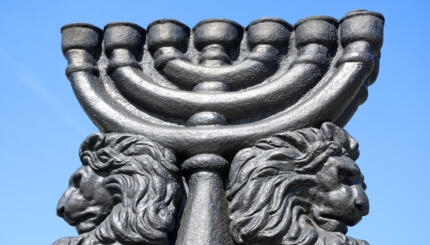Commentary on Parashat Tzav, Leviticus 6:1-8:36
In the beginning of Parashat Tzav, the first sacrifice introduced is the Korban Olah. We are taught that the fire that burns this sacrifice should not be extinguished, and that the limbs of this sacrifice should burn throughout the night. The kohen, the priest, lifts these ashes ceremoniously and then changes clothes. He then removes the ashes from the altar and carries them outside the encampment.
The question arises in the Talmud of how the is chosen for this task. The of Tractate Yom Hakippurim gives a painful but interesting history lesson.
Talmud Yoma 22a
Mishnah: Originally whosoever desired to remove [the ashes from] the altar did so. If they were many, they would run and mount the ramp [of the altar] and he that came first within four cubits obtained the privilege.
If two were even, the officer would say to them [all:] raise the finger! and how many did they put forth? One or two but one did not put forth the thumb in the Temple.

Help us keep Jewish knowledge accessible to millions of people around the world.
Your donation to My Jewish Learning fuels endless journeys of Jewish discovery. With your help, My Jewish Learning can continue to provide nonstop opportunities for learning, connection and growth.
It once happened that two were even as they ran to mount the ramp. One of them pushed his fellow who fell and broke his leg. When the court saw that they incurred danger, they ordained that the ashes of the altar be cleared only by a lottery.
Your Mishnah Navigator
1. What would be the purpose of having a race to the altar?
2. Why did someone have to get hurt before the practice was halted?
Later on, when commenting on this Mishnaic incident, the Gemara recounts another tragedy which resulted from the Kohanim racing up the platform to retrieve the ashes:
Talmud Yoma 23a
Our Rabbis taught: It once happened that two priests were equal as they ran to mount the ramp and when one of them came first within four cubits of the altar, the other took a knife and thrust it into his heart.
Rabbi Zadok stood on the steps of the Hall and said: Our brethren of the house of Israel, hear ye! Behold it says: If one be found slain in the land… then thy elders and judges shall come forth… On whose behalf shall we offer the heifer whose neck is to be broken, on behalf of the city or on behalf of the Temple Courts? All the people burst out weeping.
The father of the young man came and found his son still in convulsions.
He said: ‘May he be an atonement for you. My son is still in convulsions and the knife has not become unclean.’
[His remark] comes to teach you that the cleanness of their vessels was of greater concern to them even than the shedding of blood. Thus is it also said: Moreover Manasseh shed innocent blood very much, till he had filled Jerusalem from one end to the other.
Your Talmud Navigator
1. Whom does Rabbi Zadok think is responsible for the death of the kohen?
2. Why doesn’t he blame the person who murdered his fellow kohen?
3. What is the institutional responsibility here?
4. What motivates the kohanim who arise early to run up the ramp to clear the ashes?
5. What happens to the society when its sacred instruments are valued more than the people who use them?
A Word
It is ironic that the prize offered for winning the race is a pile of ashes. The says that the reason a lottery was not implemented was that they assumed few would rise early in the morning for such a task. Many arose early to serve God in this way. This was devotion that required extra effort, but it was devotion that would serve God at the expense of God’s own creation.
The irony that passionate devotion to the service of God can cause some to be contemptuous of human life is an old one. While the Mishnah warns of broken legs, the reminds that this is only where it begins. If removing the ashes from the altar has become an end justified by any means, then this altar may as well be a Roman circus. If the purity of a knife takes precedence over the life of one’s child, what does that say about the culture within which one lives?
The rabbis in recounting these uncomplimentary incidents caution those whose job it is to be God’s formal servants. They are the ones in jeopardy of losing not only perspective, but what many hope is a natural, intuitive moral compass. The spiritual leaders among us need to be reminded that their temptations may emanate from the very execution of their sacred tasks. The Talmud reminds us that God is never reached by pushing somebody out of the way.
Provided by Hillel’s Joseph Meyerhoff Center for Jewish Learning, which creates educational resources for Jewish organizations on college campuses.




